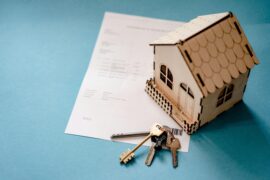This article may contain references to products or services from one or more of our advertisers or partners. We may receive compensation when you click on links to those products or services. Nonetheless, our opinions are our own.

Updated by Albert Fang
Buying a house is an exciting experience and one of the best things that could happen to you. However, the journey to owning a home begins long before you sign on that dotted line. Even before you identify your dream home, crucial factors must be considered for a successful purchase. The first and most important step is to sort out your finances, particularly your credit.
A bad credit score is a recipe for disaster if you want to buy a house. The last thing you want is to pay high-interest rates on your mortgage (if you get approved), let alone have your applications rejected. Taking the time to work on your credit-worthiness sounds like a daunting process but it is necessary if you’re serious about owning a house.
Here are 5 sure ways to boost your credit before you buy a house;
Get Your Credit Report
If you don’t have a recent credit report and don’t know your credit score, what are you waiting for? To improve your credit, you must first know your score. You should also check that all the information is accurate and up to date. It might have errors that require correction and clarification.
First, verify that your name and address are correct. Family names can be the same so, make sure it’s your information or else you could have someone else’s report. Check your social security details thoroughly.
Check your account details as well; several accounts and verify the current status of each- are they still open, recently closed or delinquent? You may have an account that you had paid off, but the report is showing it’s not paid.
Your report indicates to borrowers for what period you have handled credit, the amount of debt you have and whether you’ve been making prompt payments. All this information is fed into a formula and results in your credit score.
FICO is a popular formula ranging from 300 to 850. Credit scores above 740 are excellent.
You can access your free report once every 12 months from each of the credit reporting bureaus; Experian, Equifax, and TransUnion. Just go to the Annual Credit Report website. If you use credit cards, the bank can avail you with free monthly credit reports.
Dispute Errors in Your Report
Any errors on your report can affect your score and complicate your mortgage application. Every year, 25% of declined mortgage applicants are attributed to errors in the credit report. If you discover any errors, put together your relevant documents verifying the accurate information. Attach them to a dispute letter and mail them to the credit reporting bureau.
Keep your copies of all the dispute documentation safely. Also, inform the creditors about your findings. The credit bureau should send a response within 30 days. Correcting the errors will take a while, but it’s better to deal with it as soon as possible.
Reduce Your Debts
If you have unpaid old debts, address them first. If you can’t pay them off fully, commit to paying a specific amount each month until they are paid. Also, pay your utility bills promptly. Late payment can affect your credit.
Lenders will want to know your debt-to-income ratio, that is, the amount you earn compared to the amount you owe. This ratio and your overall credit score will determine the type of mortgage you will be eligible for. For the best mortgage terms, do not apply until your debt is low.
Some professionals advise that it’s better to lower your debt by paying off larger debts first with the help of Realistic Loans (the avalanche method) while others recommend starting with the smallest debts (the snowball method). Research has proven that the snowball method is more effective. Use whatever method you’re comfortable with. What matters is that you’re actively reducing your debt.
Stop Major Credit Expenses
As you plan to apply for a mortgage, it’s important to reduce big credit purchases. Focus on growing your credit-worthiness and avoid buying unnecessary items like cars and pricey vacations. Acquiring new credit is out of the question if you plan to own a house soon. Banks will not approve your mortgage if they notice big financial changes right before your application.
Pay off your credit cards and reduce your utilization to under 30%. Lenders are interested in seeing what you’re able to pay off your debts. Only use your credit card to pay for small expenses like groceries and gas in the car.
Review Your Budget and Save Money
Reviewing your financial decisions should not only be because you want that mortgage approval. When you get to the house, you should not continue to struggle. You should be able to keep your house by making those mortgage payments and maintain it by paying your utility bills.
Start reviewing your monthly budget even before acquiring the mortgage. Homeownership comes with extra financial responsibilities. Potential homeowners need to start putting aside some savings for their down payment. Many lenders accept 20% for a down payment.
If your dream home is $ 150,000, you will need to save $ 30,000 plus closing costs. If your savings don’t amount to 20%, you might be able to put down 10%. However, interest rates will be much higher. A 20% down payment shows lenders that they can trust you. It also brings down the interest rate and you won’t have to pay private mortgage insurance every month.
Many prospective homeowners think that the house costs end with the mortgage. Your budget should include furnishings, repairs, landscaping, and renovations. Depending on the house you’re moving to, the utility bills may be higher. Budgeting and saving in anticipation of such changes prepare you financially.
Wrap Up
Boosting your credit will not happen overnight. It will take a couple of months or even a few years. It depends on how bad your credit score is and your adherence to these steps. With hard work, patience, and consistency, your credit will start to go up and your dream of owning a house will soon become a reality.

Reviewed and edited by Albert Fang.
See a typo or want to suggest an edit/revision to the content? Use the contact us form to provide feedback.
At FangWallet, we value editorial integrity and open collaboration in curating quality content for readers to enjoy. Much appreciated for the assist.
Did you like our article and find it insightful? We encourage sharing the article link with family and friends to benefit as well - better yet, sharing on social media. Thank you for the support! 🍉
Article Title: 5 Ways to Boost Your Credit and Buy a House
https://fangwallet.com/2019/03/26/5-ways-to-boost-your-credit-and-buy-a-house/The FangWallet Promise
FangWallet is an editorially independent resource - founded on breaking down challenging financial concepts for anyone to understand since 2014. While we adhere to editorial integrity, note that this post may contain references to products from our partners.
The FangWallet promise is always to have your best interest in mind and be transparent and honest about the financial picture.
Become an Insider

Subscribe to get a free daily budget planner printable to help get your money on track!
Make passive money the right way. No spam.
Editorial Disclaimer: The editorial content on this page is not provided by any of the companies mentioned. The opinions expressed here are the author's alone.
The content of this website is for informational purposes only and does not represent investment advice, or an offer or solicitation to buy or sell any security, investment, or product. Investors are encouraged to do their own due diligence, and, if necessary, consult professional advising before making any investment decisions. Investing involves a high degree of risk, and financial losses may occur including the potential loss of principal.
Source Citation References:
+ Inspo












































